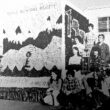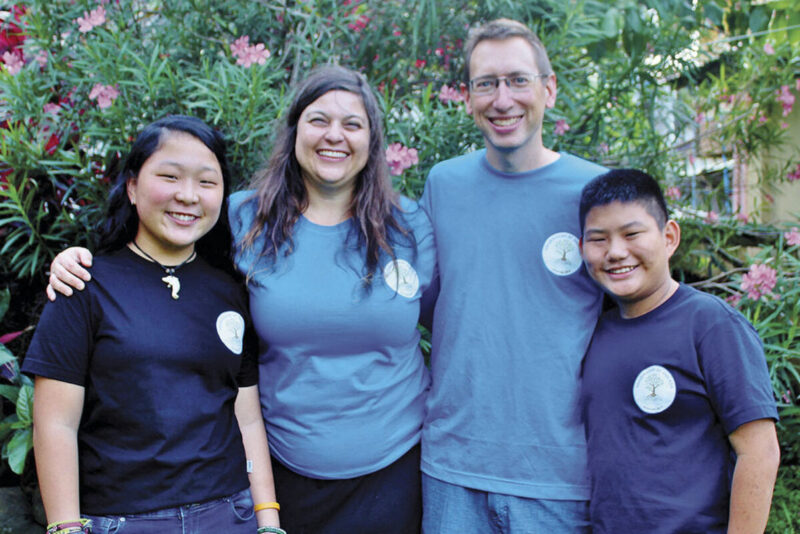Tim Swanson
Editor’s note: Tim Swanson, formerly an elementary school teacher in Sweet Home, and his family have worked in Christian missions outreach in the Philippines, mostly to youth and children, since 2016. They live on the island of Mindoro, where they have been experiencing a much more severe lockdown, due to COVID-19, than Oregonians have. Here is a report of their experience.
Relationships matter in the Philippines.
Our streets are usually populated with people talking, children playing together in groups, and motorcycles and trisikels (motorized tricycles) buzzing towards their destinations. In the background, there is often a basketball game happening at the neighborhood court.
Stores are open and kids run by with some groceries for Mom. Life in the Philippines keeps up a lively rhythm, which is why it is so strangely quiet during this quarantine. Now, the streets are silent, except for an occasional masked motorist hurrying home.
On March 16, Philippine President Duterte declared an enhanced community quarantine over an area called Luzon, which includes the main island, as well as the island of Mindoro, which is where our family from Sweet Home lives and does youth and family outreach.
March 16 was a normal night, as we were out to pizza with two other families. In the midst of the conversations, adults looked worriedly at their phones. COVID-19 had arrived in Manila and we were learning that our island would be isolated from incoming travelers. Anyone who left the island would be forbidden to return.
Over the next few days, many communities in the Luzon area closed their doors to travel, resulting in some people being stranded and many others sheltered in their homes.
Life under enhanced community quarantine in a developing nation is something that none of us had ever experienced before. It was easy to be fearful of the unknowns, so we set our hearts and minds on trusting God’s provision and providence for our family.
Our current quarantine is basically a lockdown for all members of the family except for one. One member is allowed to leave the house two times a week to get groceries. Police, military and government officials sit at checkpoints along the road, requiring a quarantine pass.
All jobs have been shut down in the community, except for frontliners and those deemed essential. All public transportation has become illegal, which deeply impacts many Filipino families, who make their living by transporting passengers. All construction, sit-down restaurants, and tourism has been halted.
In a developed nation like the United States, the pandemic is having significant economic and social effects.
Yet, it is difficult to communicate how tremendously this shutdown impacts families who live in extreme poverty on the island of Mindoro. In normal times, many families work for that day’s food.
People usually don’t have pantries and many don’t have refrigerators. Most families in the area where we minister make their living from tourism, transportation, or construction, which means that most of them aren’t able to provide for their daily meals. Some families have funds that come from family members working overseas, but many are living in a small two-room plywood house without food in the cupboards.
Under strict quarantine enforcement, people can’t earn money for that day’s food. It is also difficult to store food for multiple days in a tropical environment without a refrigerator. Many people in extreme poverty approximately earn between $2 to $8/day, and a dozen eggs cost $1.96, for example.
So, in a lockdown situation, there aren’t many families that have savings or cash reserves to fall back on.
One of the most important things that we’ve learned as missionaries to people living in extreme poverty is that the truth of Matthew 6:33 applies in every situation: “Seek first God’s kingdom and His righteousness and God will provide everything you need for daily living.”
Many people are seeking God during this time, and He is providing for their needs from a variety of sources. The government is giving out food and rice to families in need, as well as families are sharing resources with each other and giving to the local government frontliners to distribute.
Our supporters in the United States and Australia have been able to give groceries and rice to needy families here on Mindoro Island. We’ve been blessed to give rice to families living up on the mountain through the local government. Our main strategy has been to provide rice to the local pastors, who in turn give it out to needy families who are sitting down to empty plates. Since we are unable to move freely, we are also working with medical missionaries Doctor Francis and Leah Daytec, who are dropping off food at the church locations and in mountain villages.
Life under this quarantine is difficult, with schools closed and families restricted to their houses and yards. Under threat of jail and in consideration of other’s health, most people are obeying the quarantine laws.
Electricity is sporadic and can go off for a whole day, which increases the feeling of being locked down, as this is the Philippines’ tropical summer season.
In the midst of this, there are many good things taking place. The cultural value that relationships matter is blossoming. Many people are spending time as families, enjoying outdoor BBQ or gardening. Dads are setting up makeshift pools, using tarps, and neighbors are sharing resources and food over the fence.
Pastors are sending out messages of hope over Facebook live. The buzz of conversations and laughter is starting to break the quarantine silence. Fear has lost its grip.
People are being the hands and feet of Jesus in their communities, as they find creative ways to encourage and help each other survive, no… thrive in this time of uncertainty and isolation.
For more about the Swansons’ activities on Mindoro, visit http://www.SwansonMission.com.





